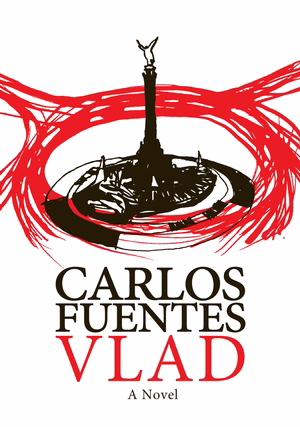.
.
Count Vladimir Radu of Wallachia — Vlad the Impaler, scourge of fifteenth-century Central Europe — comes to contemporary Mexico City to settle down and resume the terrors necessary to sustain his eternal life.
If at first that premise sounds to you like a pitch made by a desperate screenwriter to a bunch of schlock-meister cable network execs, don’t be misled. In the hands of a purposeful writer like Carlos Fuentes, an author of broad perspective and fluent literary skills, the conventional story line of vampire genre fiction mutates into a compelling allegory. The result is sly — and deadly serious.
What Fuentes cares about is the unnervingly wayward state of our moral condition. I suspect he approached the writing of this book as an experiment testing whether, through the aura of the Devil, his message of warning could be freshly conveyed. I, for one, think Fuentes achieved his goal.
From the very start of “Vlad” the Devil’s infiltration is felt. Page by page small stitches are added to the story’s fabric, new notes of dread harbored in a word, a phrase, a gesture, an observation.
The first chapter introduces us to an aged attorney who heads a politically connected firm where the narrator, also an attorney, is employed. This old “holy terror” is a man of “moral flexibility” who comes from “obscure origins.” He has “slithered” from one presidential administration to the next, growing in power while displaying “superficial courtesy and empty praise.” He behavior is always accompanied by an “ironic smile.” Later, in the fourth of 14 short chapters, when Count Vladimir Radu himself is introduced to us (“All my friends call me Vlad,” he says), the narrator’s reaction is simply this: “He looked like a ridiculous marionette.” This blithe judgment is soon replaced by chilling discoveries about Vlad’s mission, with terrible consequences for the narrator, his wife, and daughter.
It’s no surprise that, at bottom, Fuentes is a moralist. He views our day and age as an arena in which it’s easy to find ageless signs of evil. “In this world we all use each other,” says Vlad; “some of us win, others lose. Accept this.” The novel shows how evil insinuates itself into the work environment, corrupts professional duties, and sunders the most intimate of family relationships. In every sphere of life, Fuentes wants us to understand, the temptations of the Devil and his minions are here to provoke the fall of men and the malfunctioning of society. On the horizon is the ultimate horror: “The unyielding desire of Vlad the Impaler: to translate his cruel political power into cruel supernatural power; to rule not only over his time, but over eternity.”
In the last chapter of the book the narrator recounts his final confrontation with Vlad. It ends with him turning his back on the vampire, and then listening:
“… a sacred voice, hidden until that moment, whispered into my ear, from within my soul, that the secret of the world is that it’s unfinished, because God himself is unfinished. Perhaps, like the vampuire, God is a nocturnal and mysterious being who has not yet manifested or understood Himself, and that is why he needs us. To live so that God doesn’t die. To carry on living the unfinished work of a yearning God.”
Although the novel is dark, Fuentes does not forget to give expression to his lyrical talents. In the middle of an evening conversation at the decaying mansion of his boss, the narrator pauses to notice how “the light from the burning logs played on our faces like murky remains of sunlight.” A tender recollection of the loss of a child is delivered in heart-breaking language. It ends with a cadence: “This absence that is a presence. This silence that seeks voice. This portrait forever trapped in childhood …”
Adding seasoning to the swiftly told story of “Vlad” are Fuentes’ signature interests in issues of social class and politics. One theme I found thought-provoking is the notion that honest work is the most effective antidote to evil. Yet as with any such prescription, this guidance comes with bad side effects. I suspect Fuentes, when introducing the idea, may have had in mind the contrary opinion of the Mexican-born early Marxist, Paul Lafargue, who in his 1883 treatise, “The Right to Be Lazy,” declared the work ethic to be a vampire sucking the blood of modern society.
A final mention should be made of the prominence of attorneys in this tale. They — and by extension the legal system — are repeated targets of Fuentes’ satire (“the lawyer never spoke without a specific ulterior motive”). “Vlad” would make a great gift for your favorite, or better still, the least favorite — attorney in your life.
.
[Note: An abbreviated version of this book review appears on Amazon, here.]
Tags: Carlos Fuentes, Count Vladimir Radu, Paul Lafargue, The Right to be Lazy, Vlad, Vlad the Impaler, Wallachia
